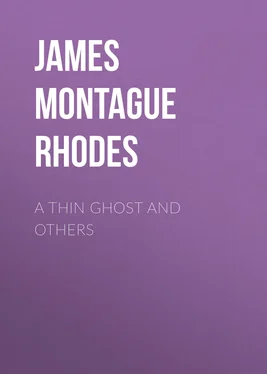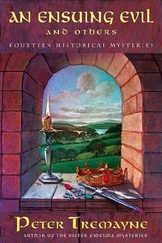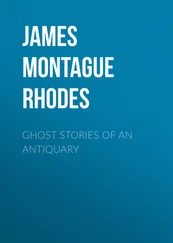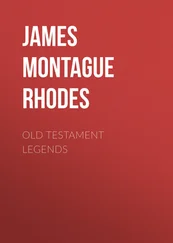Montague James - A Thin Ghost and Others
Здесь есть возможность читать онлайн «Montague James - A Thin Ghost and Others» — ознакомительный отрывок электронной книги совершенно бесплатно, а после прочтения отрывка купить полную версию. В некоторых случаях можно слушать аудио, скачать через торрент в формате fb2 и присутствует краткое содержание. Жанр: foreign_prose, Ужасы и Мистика, foreign_antique, на английском языке. Описание произведения, (предисловие) а так же отзывы посетителей доступны на портале библиотеки ЛибКат.
- Название:A Thin Ghost and Others
- Автор:
- Жанр:
- Год:неизвестен
- ISBN:нет данных
- Рейтинг книги:4 / 5. Голосов: 1
-
Избранное:Добавить в избранное
- Отзывы:
-
Ваша оценка:
- 80
- 1
- 2
- 3
- 4
- 5
A Thin Ghost and Others: краткое содержание, описание и аннотация
Предлагаем к чтению аннотацию, описание, краткое содержание или предисловие (зависит от того, что написал сам автор книги «A Thin Ghost and Others»). Если вы не нашли необходимую информацию о книге — напишите в комментариях, мы постараемся отыскать её.
A Thin Ghost and Others — читать онлайн ознакомительный отрывок
Ниже представлен текст книги, разбитый по страницам. Система сохранения места последней прочитанной страницы, позволяет с удобством читать онлайн бесплатно книгу «A Thin Ghost and Others», без необходимости каждый раз заново искать на чём Вы остановились. Поставьте закладку, и сможете в любой момент перейти на страницу, на которой закончили чтение.
Интервал:
Закладка:
Mrs. Ashton was sadly right in her forecast. I have no inclination to imagine the last scene in detail. What Dr. Ashton records is, or may be taken to be, important to the story. They asked Frank if he would like to see his companion, Lord Saul, once again. The boy was quite collected, it appears, in these moments. "No," he said, "I do not want to see him; but you should tell him I am afraid he will be very cold." "What do you mean, my dear?" said Mrs. Ashton. "Only that;" said Frank, "but say to him besides that I am free of them now, but he should take care. And I am sorry about your black cockerel, Aunt Ashton; but he said we must use it so, if we were to see all that could be seen."
Not many minutes after, he was gone. Both the Ashtons were grieved, she naturally most; but the doctor, though not an emotional man, felt the pathos of the early death: and, besides, there was the growing suspicion that all had not been told him by Saul, and that there was something here which was out of his beaten track. When he left the chamber of death, it was to walk across the quadrangle of the residence to the sexton's house. A passing bell, the greatest of the minster bells, must be rung, a grave must be dug in the minster yard, and there was now no need to silence the chiming of the minster clock. As he came slowly back in the dark, he thought he must see Lord Saul again. That matter of the black cockerel—trifling as it might seem—would have to be cleared up. It might be merely a fancy of the sick boy, but if not, was there not a witch-trial he had read, in which some grim little rite of sacrifice had played a part? Yes, he must see Saul.
I rather guess these thoughts of his than find written authority for them. That there was another interview is certain: certain also that Saul would (or, as he said, could) throw no light on Frank's words: though the message, or some part of it, appeared to affect him horribly. But there is no record of the talk in detail. It is only said that Saul sat all that evening in the study, and when he bid good-night, which he did most reluctantly, asked for the doctor's prayers.
The month of January was near its end when Lord Kildonan, in the Embassy at Lisbon, received a letter that for once gravely disturbed that vain man and neglectful father. Saul was dead. The scene at Frank's burial had been very distressing. The day was awful in blackness and wind: the bearers, staggering blindly along under the flapping black pall, found it a hard job, when they emerged from the porch of the minster, to make their way to the grave. Mrs. Ashton was in her room—women did not then go to their kinsfolk's funerals—but Saul was there, draped in the mourning cloak of the time, and his face was white and fixed as that of one dead, except when, as was noticed three or four times, he suddenly turned his head to the left and looked over his shoulder. It was then alive with a terrible expression of listening fear. No one saw him go away: and no one could find him that evening. All night the gale buffeted the high windows of the church, and howled over the upland and roared through the woodland. It was useless to search in the open: no voice of shouting or cry for help could possibly be heard. All that Dr. Ashton could do was to warn the people about the college, and the town constables, and to sit up, on the alert for any news, and this he did. News came early next morning, brought by the sexton, whose business it was to open the church for early prayers at seven, and who sent the maid rushing upstairs with wild eyes and flying hair to summon her master. The two men dashed across to the south door of the minster, there to find Lord Saul clinging desperately to the great ring of the door, his head sunk between his shoulders, his stockings in rags, his shoes gone, his legs torn and bloody.
This was what had to be told to Lord Kildonan, and this really ends the first part of the story. The tomb of Frank Sydall and of the Lord Viscount Saul, only child and heir to William Earl of Kildonan, is one: a stone altar tomb in Whitminster churchyard.
Dr. Ashton lived on for over thirty years in his prebendal house, I do not know how quietly, but without visible disturbance. His successor preferred a house he already owned in the town, and left that of the senior prebendary vacant. Between them these two men saw the eighteenth century out and the nineteenth in; for Mr. Hindes, the successor of Ashton, became prebendary at nine-and-twenty and died at nine-and-eighty. So that it was not till 1823 or 1824 that any one succeeded to the post who intended to make the house his home. The man who did was Dr. Henry Oldys, whose name may be known to some of my readers as that of the author of a row of volumes labelled Oldys's Works , which occupy a place that must be honoured, since it is so rarely touched, upon the shelves of many a substantial library.
Dr. Oldys, his niece, and his servants took some months to transfer furniture and books from his Dorsetshire parsonage to the quadrangle of Whitminster, and to get everything into place. But eventually the work was done, and the house (which, though untenanted, had always been kept sound and weather-tight) woke up, and like Monte Cristo's mansion at Auteuil, lived, sang, and bloomed once more. On a certain morning in June it looked especially fair, as Dr. Oldys strolled in his garden before breakfast and gazed over the red roof at the minster tower with its four gold vanes, backed by a very blue sky, and very white little clouds.
"Mary," he said, as he seated himself at the breakfast table and laid down something hard and shiny on the cloth, "here's a find which the boy made just now. You'll be sharper than I if you can guess what it's meant for." It was a round and perfectly smooth tablet—as much as an inch thick—of what seemed clear glass. "It is rather attractive at all events," said Mary: she was a fair woman, with light hair and large eyes, rather a devotee of literature. "Yes," said her uncle, "I thought you'd be pleased with it. I presume it came from the house: it turned up in the rubbish-heap in the corner." "I'm not sure that I do like it, after all," said Mary, some minutes later. "Why in the world not, my dear?" "I don't know, I'm sure. Perhaps it's only fancy." "Yes, only fancy and romance, of course. What's that book, now—the name of that book, I mean, that you had your head in all yesterday?" " The Talisman , Uncle. Oh, if this should turn out to be a talisman, how enchanting it would be!" "Yes, The Talisman : ah, well, you're welcome to it, whatever it is: I must be off about my business. Is all well in the house? Does it suit you? Any complaints from the servants' hall?" "No, indeed, nothing could be more charming. The only soupçon of a complaint besides the lock of the linen closet, which I told you of, is that Mrs. Maple says she cannot get rid of the sawflies out of that room you pass through at the other end of the hall. By the way, are you sure you like your bedroom? It is a long way off from any one else, you know." "Like it? To be sure I do; the further off from you, my dear, the better. There, don't think it necessary to beat me: accept my apologies. But what are sawflies? will they eat my coats? If not, they may have the room to themselves for what I care. We are not likely to be using it." "No, of course not. Well, what she calls sawflies are those reddish things like a daddy-longlegs, but smaller, 1 1 Apparently the ichneumon fly ( Ophion obscurum ), and not the true sawfly, is meant.
and there are a great many of them perching about that room, certainly. I don't like them, but I don't fancy they are mischievous." "There seem to be several things you don't like this fine morning," said her uncle, as he closed the door. Miss Oldys remained in her chair looking at the tablet, which she was holding in the palm of her hand. The smile that had been on her face faded slowly from it and gave place to an expression of curiosity and almost strained attention. Her reverie was broken by the entrance of Mrs. Maple, and her invariable opening, "Oh, Miss, could I speak to you a minute?"
Интервал:
Закладка:
Похожие книги на «A Thin Ghost and Others»
Представляем Вашему вниманию похожие книги на «A Thin Ghost and Others» списком для выбора. Мы отобрали схожую по названию и смыслу литературу в надежде предоставить читателям больше вариантов отыскать новые, интересные, ещё непрочитанные произведения.
Обсуждение, отзывы о книге «A Thin Ghost and Others» и просто собственные мнения читателей. Оставьте ваши комментарии, напишите, что Вы думаете о произведении, его смысле или главных героях. Укажите что конкретно понравилось, а что нет, и почему Вы так считаете.











